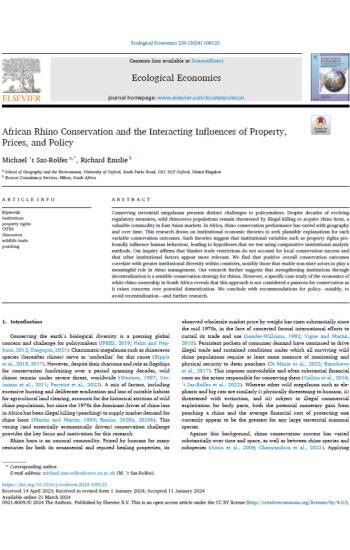

African Rhino Conservation - Interacting Influences
Conserving terrestrial megafauna presents distinct challenges to policymakers. Despite decades of evolving regulatory measures, wild rhinoceros populations remain threatened by illegal killing to acquire rhino horn, a valuable commodity in East Asian markets. In Africa, rhino conservation performance has varied with geography and over time. This research draws on institutional economic theories to seek plausible explanations for such variable conservation outcomes. Such theories suggest that institutional variables such as property rights profoundly influence human behaviour, leading to hypotheses that we test using comparative institutional analytic methods.
Our inquiry affirms that blanket trade restrictions do not account for local conservation success and that other institutional factors appear more relevant. We find that positive overall conservation outcomes correlate with greater institutional diversity within countries, notably those that enable non-state actors to play a meaningful role in rhino management. Our research further suggests that strengthening institutions through decentralization is a sensible conservation strategy for rhinos. However, a specific case study of the economics of white rhino ownership in South Africa reveals that this approach is not considered a panacea for conservation as it raises concerns over potential domestication. We conclude with recommendations for policy—notably, to avoid recentralization—and further research.
't Sas-Rolfes, M., & Emslie, R. (2024). African rhino conservation and the interacting influences of property, prices, and policy. Ecological Economics, 220, 108123. https://doi.org/10.1016/j.ecolecon.2024.108123
-

Dr Michael 't Sas-Rolfes
Research Associate -
Richard Emslie
We support the free flow of information. Please share:
More content
-

What Foot and Mouth Disease-free means for South Africa’s game meat trade
Ms Lydia Daring Bhebe…Explore the latest developments in South African provinces achieving and maintaining Foot and Mouth Disease (FMD) free status…
Articles -

The world wildlife trade regulator is 50 – here’s what has worked and what needs to change
Daniel Challender…Most countries implement Cites, the Convention on International Trade in Endangered Species of Wild Fauna and Flora as…Articles -

Enabling Sustainable Wildlife Trade
Prof Francis VorhiesEnabling sustainable wildlife trade is a key policy measure for growing Africa's wildlife economy. In this respect, CITES…
Articles -

Has CITES become too complicated to be effective?
Prof Francis VorhiesGovernments agreed to the text of CITES in the 1970s, which is quite straightforward. However, the agreement’s implementation…
Articles -

From poachers to providers: Can Africa's wild meat market save wildlife?
Dr Wiseman NdlovuHave you ever considered how wild meat could be more than just a cultural staple but also a…
Articles -

As a fellow of the African Wildlife Economy Institute (AWEI), I am excited to attend the upcoming 3rd…
Articles -

A theory of change to improve conservation outcomes through CITES
Dr Michael 't Sas-Rolfes…Here we articulate the implied theory of change (ToC) underpinning the design and operation of CITES (Convention on...
2025Research -

Wild Meat Value Chain Integration Systems: Opportunities for Value Chain Formalisation and Scaling in Africa
Dr Wiseman Ndlovu…Establishing a legal, safe and sustainable wild meat sector promises to potentially reduce demand for illegally sourced meat...
2025Research -

AWEI's 2024 Wildlife Economy Dialogue Series
Ms Emily TaylorRediscover 2024: A year of insight and inspiration
In 2024, AWEI proudly hosted three ground-breaking dialogue series in…
Articles
Get updates by email
Through impactful research, stakeholder engagement, and professional development, AWEI is supporting the wildlife economy across Africa. Please subscribe for occasional updates on our work and forthcoming events.
Sign up for a quarterly dose of AWEI insights
In a complex and changing world, AWEI generates strategic ideas, conducts independent analysis on wildlife economies, and collaborates with global scholar-practitioners to provide training and expertise for biodiversity conservation, climate resilience, and inclusive economic opportunities in Africa.
